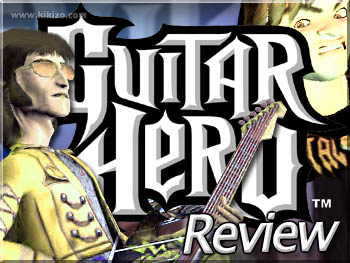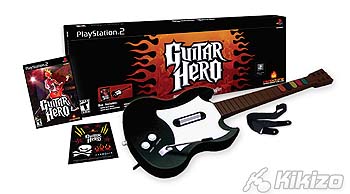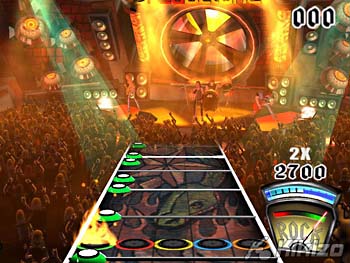Guitar Hero
The power of rock is a wonderful thing, and Guitar Hero leaves no doubt as to why.
| Version PS2 | Developer Harmonoix | Publisher RedOctane | Genre Music |
||||
As any Brit who watched Gene Simmons' recent Rock School programme will know, rock music still has the liberating, empowering qualities today that it had when it first emerged; it's something that almost every single person in the entire world can relate to and enjoy in some form. Guitar Hero is a game that is essentially a celebration of the awesome spirit of rock 'n' roll, and consequently it has found itself an audience in America that stretches far beyond that of most videogames.

The game has achieved an extraordinary thing - near-universal appeal - and it will almost certainly repeat its star performance in Europe and the UK. And it's all thanks to a little plastic toy guitar...
To any follower of Harmonix's output so far, Guitar Hero's interface will look very familiar. You pick a song from the game's strong selection of classic rock hits and coloured dots scroll down the screen towards you, each corresponding to a particular note. And it's here that Guitar Hero's true asset comes in: a half-size plastic replica of a Gibson SG, with five fret buttons for notes, a strum bar for making noise and a working whammy bar for adding flair to longer notes.
To established guitar-players, a mere five buttons might seem a little flaccid compared to the fretboard of a proper guitar, but this game is far more challenging than it looks. On Expert difficulty, you are expected to move your fingers around those buttons with the speed and agility of a true guitar god - this reviewer only knows of two people in the entirety of her gaming contacts book who can do the Symphony of Destruction solo on Expert, and even after several weeks of concentrated practice, she still cannot quite count herself among them.
Guitar Hero's extraordinary appeal can be attributed to a number of things, the first of which is its accessibility. Anyone - absolutely anyone - can strum happily along to Take Me Out on Easy, but only absolute masters will ever get to even see the final solo of Bark at the Moon on Expert, let alone be able to play it. It caters for everyone from the absolute beginner to the casual player to the obsessive rhythm-action fan to the established guitarist. Where people who play rhythm-action games on a regular basis will probably be starting the game on Normal and working their way up, mums, dads, partners, kids and non-gamer friends can gleefully set I Love Rock and Roll to Easy on a one-off basis and have just as much fun. You will never have to goad anyone into having a go on Guitar Hero - if anything, you'll be stopping people fighting over whose turn it.
The game's second strength is the variety and quality of its selection of songs. The game's thirty-odd strong selection spans the whole of rock history and has something for every taste. This is a game that you could take home for Christmas and entertain the entire family with; dads will be delighted with Killer Queen and Sharp Dressed Man, male siblings will love picking Ace of Spades on Easy and pretending to be rock gods, and because it looks like so much fun, everybody will want in on the action. The songs are covers, but they are very authentic ones - indeed, were they not introduced by a very karaoke-esque 'As Made Famous By', it would be difficult to tell them apart from their 'proper' counterparts. Each, too, works perfectly within the context of the game; there are no boring songs here. Every single one is fun to play, even if it's something you wouldn't normally listen to.
Most importantly, though, Guitar Hero is so inexhaustibly fun because it really and truly makes you feel like a rock star. Anyone who laughs at the idea of rocking out to a game with a toy guitar is clearly entirely soulless, because it's losing yourself in the music that really makes playing Guitar Hero the exhilarating and brilliant experience that it is. Harmonix was founded with the idea in mind of letting people who weren't musicians experience the incomparable joy of making music, and Guitar Hero does just that. Playing FreQuency and Amplitude with a controller is all well and good, but the pleasure there came mostly from the challenge of the game rather than the actual music; it was a gamer's pleasure rather than a musician's. Here, thanks to the little plastic guitar, you really feel as if you're part of the music - you feel like you're actually playing the songs rather than just playing a game that corresponds to them. It's an immediacy that really doesn't apply to any other rhythm action game out there, as Guitar Freaks never really conveyed the energy and spirit of a live performance in the way that Guitar Hero does.
The game's style, too, really conveys the love of rock music that the developer obviously poured into the creation of this game. As you progress through songs, you'll be performing in increasingly higher-capacity venues - and every single one bursts with character, from the little basement in which you begin to the theatres and packed-out stadiums you'll be playing in for the more challenging songs. There's a selection of guitarists, too, and though many will really miss the Create-Your-Own FreQs of Harmonix's previous games, the standardised characters are sufficiently varied (and, in the case of the Grim Ripper, humorous) to be satisfactory. Each character has their own little way of rocking out, from the tinted-spec wearing, subdued emo idiot to the burly metal chap to the British punk. The menus and loading screens are very well designed, incorporating a slightly mad, graffiti-esque visual style and a selection of 'band humour' phrases whilst you wait for your song to load.
There has never been a finer peripheral-based videogame than Guitar Hero. Its immediacy, accessibility and sheer enjoyability far exceed those of any other game released in the past year and in terms of sheer universal appeal, it's something of a revolution. As a rhythm action title, it is essential; it's a piece of pioneering software that mixes pure, reactionary videogame challenge with the universally affecting power of music in order to create a game that appeals to literally everybody on some level.
| ||||||||||||
|




















 Satoru Iwata Video Interview - the late Nintendo president spoke with Kikizo in 2004 as 'Nintendo Revolution' loomed.
Satoru Iwata Video Interview - the late Nintendo president spoke with Kikizo in 2004 as 'Nintendo Revolution' loomed. Kaz Hirai Video Interview - the first of Kikizo's interviews with the man who went on to become global head of Sony.
Kaz Hirai Video Interview - the first of Kikizo's interviews with the man who went on to become global head of Sony. Ed Fries Video Interview - one of Xbox's founders discusses an epic journey from Excel to Xbox.
Ed Fries Video Interview - one of Xbox's founders discusses an epic journey from Excel to Xbox. Yu Suzuki, the Kikizo Interview - we spend time with one of gaming's most revered creators.
Yu Suzuki, the Kikizo Interview - we spend time with one of gaming's most revered creators. Tetris - The Making of an Icon: Alexey Pajitnov and Henk Rogers reveal the fascinating story behind Tetris
Tetris - The Making of an Icon: Alexey Pajitnov and Henk Rogers reveal the fascinating story behind Tetris Rare founders, Chris and Tim Stamper - their only interview? Genuinely 'rare' sit down with founders of the legendary studio.
Rare founders, Chris and Tim Stamper - their only interview? Genuinely 'rare' sit down with founders of the legendary studio. The History of First-Person Shooters - a retrospective, from Maze War to Modern Warfare
The History of First-Person Shooters - a retrospective, from Maze War to Modern Warfare